

ICC Champions Trophy 2013
By Francis Saldanha
Bellevision Media Network
05 Jun 2013: Infamously called the ’unwanted child’ of world cricket, the ICC Champions Trophy is now wobbles on its last legs. The seventh edition of the 50-over tournament which has undergone several changes in both participation criterion and structure beginning in England and Wales on June 6 will be the last ICC Champions Trophy. A new concept aimed at bolstering the treasury of the ICC, with the particular aim of helping cricket development in the ’lesser’ countries, has somehow been allowed to die a natural death, the proliferation and success of the Twenty20 format claiming its first, unsung victim.
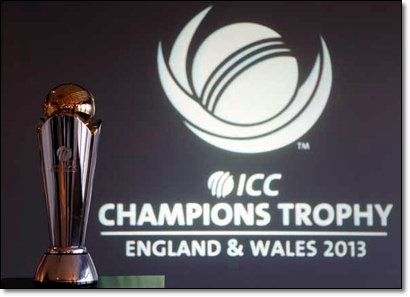
The summer of 2013 will see the world’s top eight best one-day Cricket Teams in the ICC ODI rankings will battle it out for the ICC Champions Trophy in England. The tournament has been played on six occasions and the ensuing one in June 2013 in England and Wales would be the last. Initially christened the ICC Knockout trophy, the event was to be held in non Test-playing venues in a self-explanatory knockout format, involving the best sides in the world gunning for glory in a compressed, highly exciting sub-plot to the more elaborate, more intricate 50-over World Cup. The first three editions, in Dhaka in 1998, Nairobi in 2000 and Colombo in 2002, were outstanding successes. The tournament was snappy, the cricket of a high quality, the best in the world relishing the opportunity of going head-to-head in a competition not as high-profile as the World Cup but still a prestigious, must-win event. The tournament gone yet another change in name to be called as ICC Champions Trophy in 2002-03 and were played in Sri Lanka. There is no change of name since then and it has been played in England in 2004, in India in 2006-07 and in South Africa in 2009-10.
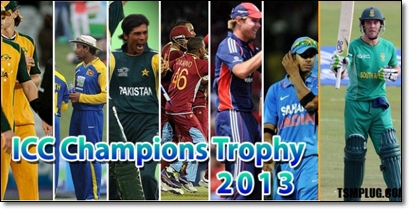
The 50-overs-a-side competition begins in Cardiff on June 6 with a heavyweight clash between the current ICC World Cup holders India and South Africa, winners of the inaugural Champions Trophy tournament in 1998. The group stages at Edgbaston also include two eagerly anticipated head-to-head contests between arch sporting rivals Australia and New Zealand - on June 12 - and India and Pakistan - on June 15. Cardiff, Edgbaston and the Oval each host four group matches in the competition which sees the eight teams divided into two pools of four. Group A features Australia, England, New Zealand and Sri Lanka with India, Pakistan, South Africa and West Indies contesting Group B. The top two teams from each group advance to the semi-finals, hosted at the Oval and Cardiff, with the winners then progressing to the final at Edgbaston on Sunday 23 June.
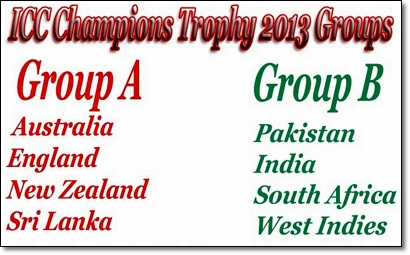
ICC Champions Trophy has always been a coveted trophy among all top cricket playing nations. With days left to the Champion’s Trophy, Indian team is bidding to lay their hands on the trophy for the first time. Indian performance in the Champions Trophy has been top class. The cricket world champions however, are going in with an inexperienced squad which is not used to English conditions. The selectors dropped Virender Sehwag, Harbhajan Singh, Gautam Gambhir and Yuvraj Singh amongst others who played a vital role in earning India their second World Cup. The pressure would be on young shoulders of Shikhar Dhawan, Vijay, Karthik and Rohit Sharma who have been given an opportunity to prove their mettle. But it might prove to be a huge gamble since these players lack experience. Murali Vijay has been a slow starter whilst Rohit has been in and out of the team for a long time. Karthick has been out of international cricket for a while but the performance in the Indian Premier League shows a promising future for the wicket-keeper batsman. Dhawan has won accolades after the fastest ton on debut and he would look to replace Sehwag permanently as an attacking opener.

The English conditions are bowler friendly with hard, dry and bouncy pitches, which can test batting skills to their limits. Middle order depends on Virat Kohli, Suresh Raina and MS Dhoni who have been consistent. Kohli has a fair average of around 50 in one day matches but his performance in Australia was scrutinized. Most of his runs came in under sub continental conditions and it would be good to see how he tackles the South African pacers. It is to be noted that he scored nearly 2000 runs last year. Suresh Raina, always had problems facing the short ball and he failed to attack pace bowlers. He plays a key role in shaping innings under critical conditions. The 26-year-old averages 37 in ODIs and it would be important to see his approach.
Skipper Dhoni has shown some tremendous improvement in the 2011 series against England as compared to his first visit in 2007.
To solve the problem of an all rounder, the selectors have picked up Irfan Pathan and Ravinder Jadeja. MS Dhoni would rely on his trump card Ravichandran Ashwin but Amit Mishra’s performance has been splendid. Delhi boys Ishant Sharma and Umesh Yadav would be the ones to go with Bhuvneswar Kumar. Karnataka’s Vinay Kumar is making a comeback after saving crucial runs in the final over’s during IPL matches. Bowling has always been a problem for India and with an unchallenged batting order it does look scary for the Indians. Almost in every tournament, they played well and in 2002, they shared the trophy with Sri Lanka. And once again all hopes will be on MS Dhoni and his brigade, despite the ongoing spot fixing scandal in the recently concluded IPL.
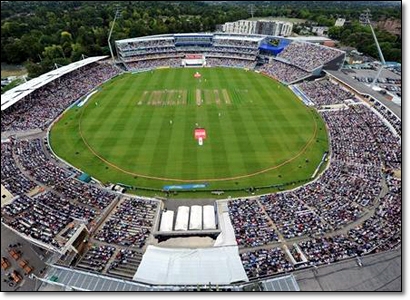
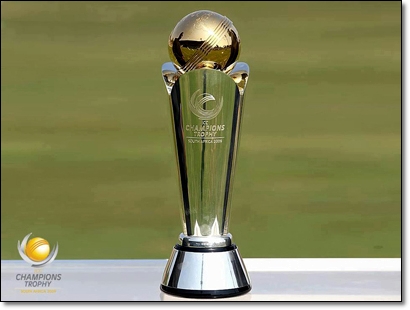
India will take on South Africa on June 6 at Cardiff and is slotted in a tough group which has West Indies and Pakistan as well. Ever since its inception 15 years ago, the ICC Champions Trophy has been a see-saw ride for the Indian cricket team. Only twice have they made the final & they were joint winners with Sri Lanka in 2002 but have contested some cracking matches.
The ICC Champions Trophy was first staged in 1998, with South Africa winning the inaugural event in Bangladesh. England becomes the only cricketing nation to host this trophy on two occasions in 2004 and 2013.